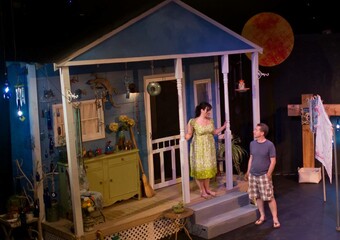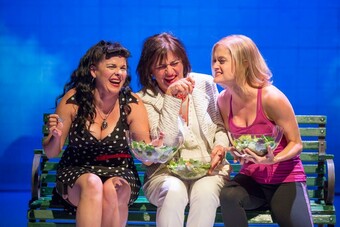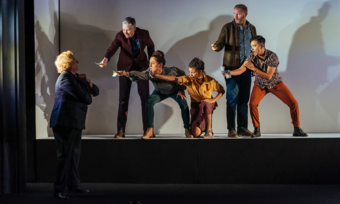Director Stevie Zimmerman Brings Fresh Energy to DC

Director Stevie Zimmerman didn’t know what to expect on moving to Washington, DC, in 2010. She feared she might find a rather traditional theater scene, with little use for the new in terms of ideas or people. The thought was a logical one. In a place replete with directors, of whom at least thirty seven are women, a newcomer to the area setting out to direct might reasonably expect to find no particular welcome. But in the four years that she has lived in Northern Virginia, Zimmerman has distinguished herself, gaining a reputation as a director who brings out the creative potential in the people she works with and who trusts the text of a play and finds ways to let it breathe, rather than sculpting it to serve her own ends. She has directed work at 1st Stage, Theater of the First Amendment, Doorway Arts, and the Wintergreen Festival, as well as for the Playwrights Forum, the Beltway Drama Series, and the Capital Fringe Festival. Originally from England, she spent more than a decade teaching text analysis, theater history, and acting and directing at the Hartt School, of the University of Hartford. Her direction last fall of Lee Hall’s The Pitman Painters, at 1st Stage—an area premiere—caught my attention for its subtlety; in Zimmerman’s hands, the story unfolded quietly and powerfully, amid a sense of sparseness that served the story well. As a judge for the Helen Hayes Awards her first two years in the DC area, Zimmerman gained familiarity with the breadth of the theater scene here and the wealth of new work being generated and produced—just the kind of work, incidentally, that thrives on the thoughtful, and generous spirit that characterizes her directorial approach.
Patricia Davis: What is the most interesting thing right now about theater in the DC area?
Stevie Zimmerman: How open the area is to new work, new people, new ideas. For example, almost every piece I have directed has been with a new or very young group or written by a local, living playwright
Patricia: What particular challenges have you faced as a director in the DC area?
Stevie: Well, I guess the biggest one is establishing any kind of presence in the first place. In that, I had some good luck in meeting people right away who were generous and helpful. My very first show in the area was another huge challenge—a farcical musical when I had directed neither farce nor musical before! I had enormous luck in finding a cast that carried me along with them to great success. Another big challenge has been tackling more new works, in staged and semi-staged formats, than I have ever encountered before. Although I often prefer to work on plays I haven’t seen before, and not to bring preconceptions along, directing a show that no one has any ideas about already, other than the playwright of course, is a different thing. Most recently the production of The Pitmen Painters, at 1st Stage, was a particularly challenging piece, requiring us to recreate not just a period and very specific place but in one of the most challenging regional accents of England. Again, a brilliant cast was key. I couldn’t believe the quality of people that came out for the audition.
Patricia: What have been some of your most interesting directing experiences here?
Stevie: Other than those above, I think two stand out. Last summer I directed a production of Yasmina Reza’s Art in a barn in the Blue Ridge Mountains. We rehearsed in library meeting rooms and one of the actor’s homes until we were actually out there. And our performances competed with the whinnying of horses in the stables below for attention! The other standout experience was doing a staged reading of a play, Michael Smith’s Passagio, for Theatre of the First Amendment. Most readings only require a single read-through rehearsal but for this one I was given four days and a remarkable cast, but no set, virtually no costumes, and almost no props. We did the whole play, which had twenty characters, and created the play’s world—a tiny town in Italy—without any of the usual support system, only blocking, imagination and character, but I think the audience forgot all that really quickly, so evocative was the writing and the acting. I’ve never done anything like it before—or since!
Patricia: Does the theater community here in the DC Metro area differ from that in other places where you’ve worked? If so, how?
Stevie: Before moving to DC/Northern Virginia, I was in in a smallish town in Connecticut where there was one professional theater—where I have worked a few times. The pool of local talent was quite small so we went to New York to audition. Consequently there wasn’t that same sense of work being entirely locally produced. Some houses in DC do go to New York for actors and designers but the places I’ve worked have really focused on sourcing artists from this community and there is such wealth here that there really isn’t any need to look further afield. Because casting is such a huge, huge piece, having that pool here is amazing. And at 1st Stage, where I’ve directed twice, there is a real focus on bringing new artists to the professional stage which is really exciting. My first show there featured four actors making their debuts!
Patricia: What do you consider your strengths as a director?
Stevie: Casting first and foremost. Getting the right mix is key. If I get it wrong it affects everything—but that hasn’t happened very much, thank goodness! Then I think I have a good manner with actors. I don’t think you get anything out of anyone with shouting, fear, or other dictatorial methods. I am where the buck stops so I will persist in what I think is the right approach but I am completely interested in what everyone brings to the table. And I think I have good spatial awareness—it is important to me what stage picture we create. I don’t mean anything necessarily clever or overly choreographed, just simple moments that don’t jar the eye. I’m also an English major so the text is king—working through the words is really exciting to me.
I don’t think you get anything out of anyone with shouting, fear, or other dictatorial methods.
Patricia: How did you first get involved in theater?
Stevie: Well, I was in my first play when I was about six and I loved it. For years I thought I wanted to be an actor, and I joined all sorts of youth groups in London, including one at the Old Vic, which was just so rich in history and theatre smells! And I took classes and performed in school plays, etc. But when I went to college I decided to try directing after another director let me down. And suddenly I felt as if I was wearing the right skin. I had always known I wasn’t a natural actor but I felt like a natural director. After my undergraduate degree I did a Masters in directing in the hope it would lead me where I am now, I guess!
Patricia: Why have you decided to make a career of directing?
Stevie: It’s the best job in theater. You have the overview, the big picture to take care of. You get the excitement of performance without having to go on every night—or learn lines! You work with brilliant people who each do their job better than you ever could. And you get to read amazing plays and dig into playwrights’ visions and poetry and laughter.
Patricia: What are you working on now? What interests you about it?
Stevie: I have two shows coming up next. One is a play, not known by me earlier, by an Argentinian writer Aristides Vargas, Our Lady of the Clouds. It’s being performed as part of the Wintergreen Performing Arts Festival in the Blue Ridge Mountains, with two DC based actors I’ve worked with before, Edward Nagel and Liz Dutton. It’s a really intriguing piece about exile and making sense of the world when what you know for sure turns out to be wrong. We’re performing in a barn and will be creating the world of the play with very little, so that’s exciting. After that I’m directing Rabbit Hole, by David Lindsey Abaire for Peter’s Alley, which is a new company in town—about two years old perhaps. This is a well known play but I didn’t know it and it is heartrending, so that’s going to be a profound process of discovery with a terrific cast. That opens in late September at Theatre on the Run in Shirlington. Beyond that—like most theater people—who knows!








Comments
The article is just the start of the conversation—we want to know what you think about this subject, too! HowlRound is a space for knowledge-sharing, and we welcome spirited, thoughtful, and on-topic dialogue. Find our full comments policy here